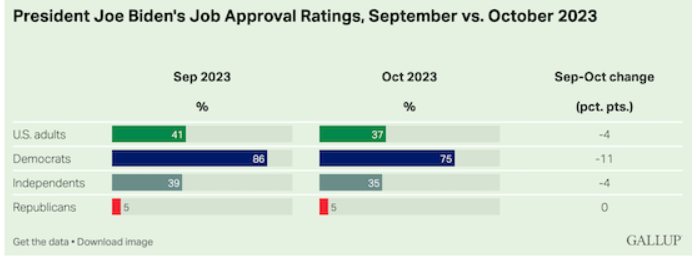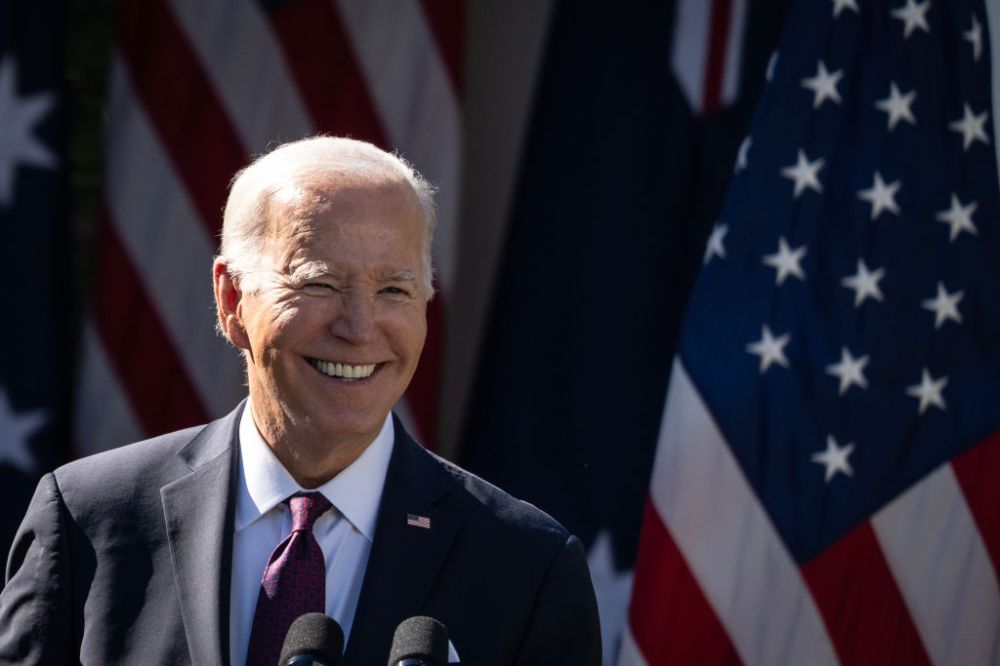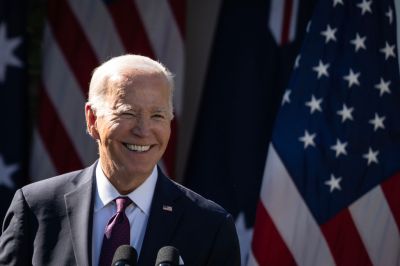On Wednesday afternoon, while most of America’s media was consumed by war in the Middle East and the election of a new House speaker, we nerds of the Dispatch staff were chattering internally about … a super PAC memo.
According to the memo, new data from the Rust Belt battlegrounds of Michigan, Pennsylvania, and Wisconsin placed Joe Biden and Donald Trump in a dead heat at 50 percent each. Among voters who dislike both candidates, Trump led by 3 points. In 2020, Biden won that cohort by 6.
Read that again. Among voters who hold negative opinions of Biden and of a guy who’s been charged with 91 felonies and whose last major act as a public servant was trying to stage a coup, Biden is behind.
Michigan, Pennsylvania, and Wisconsin accounted for 46 electoral votes in 2020, supplying the margin of victory. The unmistakable takeaway from the memo was that if Democrats proceed to renominate the president, they’re at dire risk of losing the White House to the political equivalent of the Joker.
What made this interesting to participants in the Dispatch Slack channel was that the memo didn’t come from one of Trump’s super PACs. It came from one of Biden’s.
Why on earth would a pro-Biden shop release such discouraging numbers, one staffer wondered? Normally when a candidate’s PAC leaks polling data, it’s aimed at nudging his campaign to focus on wooing a particular slice of the electorate. This memo felt more like an argument to pull the plug altogether.
Maybe it was, another staffer theorized.
By law, the campaign and the super PAC can’t communicate directly. If the PAC is seeing numbers that portend a Trump victory in the most critical swing states, the obvious way to recommend to Biden’s staff—and to the broader Democratic Party—that he shouldn’t be the nominee is to share those numbers publicly, however embarrassing that might be for all concerned.
The authors of the memo would deny that that was their intention, of course. Officially, the Democratic establishment is gung ho for a second Joe Biden term and perfectly relaxed about winning a death match with an authoritarian goblin.
But the signs of no confidence are there if you care to look. They’re hard to miss.
What did you think of the president’s summit with Xi Jinping this week?
I should clarify: Not the president of the United States. The president of California.
A few days ago, Gavin Newsom set off on a foreign charm offensive, as presidents tend to do. He stopped first in Israel, where he met Benjamin Netanyahu and viewed some of the video recorded by Hamas during the October 7 pogrom. “It connects [me] to an understanding of the emotion of the Israelis about the atrocities that occurred, and about the 1,400 lives lost” he said of the images, while confused Californians back home wondered why their tax dollars were being used to fund international diplomacy.
“I wish I was president of the United States,” he went on to tell reporters. Later he claimed he had been joking.
From Israel he traveled to Hong Kong, his first stop on a weeklong tour of China to discuss climate change. By Wednesday he was in Beijing, meeting the dictator himself for a photo op whose mise en scene suggested nothing less than two world leaders conferring about important affairs. The president of California sounded every inch a president in describing their meeting on social media:
At last check he was posing for photos on the Great Wall, gazing off in the distance while dashingly sporting a pair of Joe Biden’s trademark aviator sunglasses.
“I’m here in expectation, as you suggest, of turning the page, of renewing our friendship and reengaging (on) foundational and fundamental issues that will determine our collective faith in the future,” he said in prepared remarks before meeting with China’s top diplomat at one point this week. If the president of the United States can’t broker detente with China, perhaps the president of California can.
While Newsom was busy definitely not running a shadow campaign for the Democratic nomination, another Democrat was preparing a less shadowy campaign. This summer, House gadfly Dean Phillips wondered if Joe Biden’s critics aren’t right that he’s too old to serve a second term and spoke of potentially challenging him in the primary. By late August, having doubtless gotten an earful from his colleagues about the risk of damaging the president, he had backed off.
“Setting up a competitive campaign, the infrastructure, the people, the systems in multi-states, requires a tremendous amount of effort and time, and there are people who have laid that groundwork. I’m not one of them,” he said at the time. Fast-forward to a few days ago, when this was spotted circulating on social media:
Phillips is now expected to announce his candidacy for president on Friday. He’ll target New Hampshire, a state where Joe Biden won’t appear on the primary ballot this year.
The fact that one mainstream Democrat will soon be in the race while another is circling overhead like a vulture suggests a certain lack of confidence in the presumptive nominee. That’s true of both parties, in fact, although to very different degrees.
Superficially, the Democratic and Republican presidential primaries have become mirror images of each other. In each instance the frontrunner’s lead has grown so prohibitively huge that any remaining drama has to do with who’ll emerge as the just-in-case fallback option. On the right, Ron DeSantis and Nikki Haley have begun roundhousing each other to try to establish primacy as the one true alternative just in case Jack Smith ends up hauling Trump away before the convention. On the left, Newsom and Phillips are introducing themselves to Democratic voters just in case Mother Nature does the same to Biden.
Beneath the surface, though, the dynamics of the two races are poles apart. Trump is crushing a field of top-tier challengers because most Republican voters disgracefully continue to prefer him to any other politician in the party. His lead is a product of political strength. Biden is crushing a field of token opposition because top-tier Democratic candidates worry that many Democratic voters would prefer them to the president. Primarying him would tear the party apart and facilitate a Trump restoration. His lead is a product of political weakness.
And because it is, ambitious next-gen liberals like Newsom and eccentrics like Phillips can’t resist positioning themselves to benefit just in case Biden finally runs out of ways to rationalize continuing his campaign. (Newsom’s emergence as the party’s most combative culture warrior is no coincidence.) Many Democrats have no confidence in their leader—that he’ll make it to Election Day, that he’ll prevail if he does, or that he’ll be in any shape to govern in a second term. What if the weight of that realization finally wears Joe Biden down?
The root of Democratic despair isn’t that the president is failing at the job, I don’t think. It’s that even his apparent successes aren’t doing anything to improve his numbers. His chances at a second term increasingly feel like a pure dice-roll on whether Americans hate Trump so much that they’d rather reelect a geriatric incumbent whom they no longer deem fit for the job.
The latest data isn’t encouraging.
In the last 45 head-to-head polls between Biden and Trump tracked by RealClearPolitics, Biden has led by 1 point or less in 40 of them. That is, he’s either led by 1, tied with Trump, or trailed Trump outright.
A narrow popular vote victory next fall won’t be enough. The structural advantage provided to Trump by the Electoral College may be shrinking, but it hasn’t disappeared altogether. Biden won the popular vote by nearly 5 points in 2020 and that was barely enough to drag him over the line in the swing states he needed. He’ll need to solidly win it again to defeat Trump a second time. There’s no evidence in the head-to-head polling right now that he can.
And, remarkably, that polling has come during a period when most of the news the public is hearing about Trump is bad, while much of the news they’re hearing about Biden is good. Or good-ish.
If you don’t follow politics closely, chances are the only thing you’ve heard lately about the Republican frontrunner is that he’s been indicted on a bazillion criminal charges. You may, however, have heard that America just had another blockbuster jobs report. Or that GDP grew at a robust 4.9 percent rate in the third quarter. Or that the president has shown commendable leadership since October 7 by championing Israel’s right to defend itself, an issue on which most of the public agrees with him.
But there’s no evidence that any of it has made a lick of difference in improving Biden’s overall approval rating, which has been stuck at around 42 percent for most of the year. It was six months ago today, in fact, that he last touched 43 percent in the RealClearPolitics average. On the economy, he’s at an anemic 37.1 percent and has struggled to stay north of 40 since inflation first began to bite in 2021. Despite the roaring pace of hiring, consumer confidence remains far below its pre-pandemic peak during the Trump years. Voters still aren’t feeling the economic recovery.
No wonder some Democratic leaders have begun urging the White House to drop the term “Bidenomics.” The state of the economy isn’t one that everyone in the party wants to take ownership of. Phillips’ clever slogan, “Make America Affordable Again,” bites hard.
As for Biden’s admirable showing on Israel, Gallup reminds us that no good deed goes unpunished.

Eleven points is a big drop for a president within his own party in so short a time.
There’s no mystery as to what’s driving it. As the Israelis pound Gaza to try to eliminate Hamas, the gap in sympathy between Israel and the Palestinians among Democratic voters is shrinking. Two weeks ago I predicted that the pro-Palestinian tide among younger liberals would create a political crisis for Biden as casualties rose and the left rallied behind the “colonized” side of the fight. But I didn’t expect it to show up in polling even before the IDF ground assault had begun.
Gallup has his approval rating today at 37 percent. A president with a job approval of 37 percent on Election Day will not be reelected.
Many progressives are destined to chafe at being asked to reelect a “warmonger” who first backed Ukraine and now Israel, particularly one for whom they never had much affection to begin with. Given a binary choice between Biden and Trump, they might be persuaded to put aside their grievances and stick with the lesser of two evils, but next year won’t be a binary choice. The left will have two well-known fringe alternatives, Robert F. Kennedy Jr. and Cornel West, as a repository for protest votes.
Unsurprisingly, some early polls of a three- or four-way race show Trump benefiting from Kennedy’s and West’s candidacies at Biden’s expense.
If the hard left is losing whatever confidence it had in the president on foreign policy and swing voters have already arrived at a place of no confidence on the economy, how does Joe Biden win this election? Is it a simple matter of crossing his fingers and hoping that Trump sabotages himself?
That could definitely happen, don’t get me wrong. It wouldn’t even be the first time. I’m just not keen to wager the future of classical liberalism in America on it.
Here’s a question, though. Would a different Democratic nominee even help (much)? What if Democrats nominated the president of California to be the president of the United States?
It would help, presumably. Much of the public disenchantment with Biden is tied up in his age, I suspect. It’s trivially easy, maybe unavoidable, for a casual voter to assess his failures through the prism of his conspicuous dotage. If he can’t bring prices down or keep wars from breaking out all over the world, perhaps it’s because an 81-year-old just isn’t up for the job.
Gavin Newsom’s strengths as a politician are that he’s rhetorically agile and game to engage. One look at policy in California, beginning with housing, would convince you that he’s not up to the job either. But he’s young, deft as a communicator, and sounds in command of the facts. He’d cut a far more impressive figure in six months on the trail as nominee than Joe Biden would.
Democrats and independents would quickly grow to feel confident in him. That alone would be worth a few points against Trump.
But I wonder if it’d be fewer than we think.
Is inflation a “Biden problem” or is it a Democratic party problem? If profligate government spending (on COVID) was the catalyst, there’s no reason to think President Gavin Newsom would be more circumspect than President Joe Biden. By any measure, Newsom is the more progressive of the two.
The last place you’d look for a candidate to bring reasonable fiscal policy back to the White House is to the president of California. Inflation would be an albatross for Newsom’s candidacy, if not quite as much as for Biden’s.
And the left might find him disappointing on the subject of Israel and the Palestinians just as they’ve found Biden disappointing. Newsom’s recent goodwill visit to Netanyahu was a smart move for a left-wing politician scrambling for centrist cred just in case his party suddenly finds itself in need of a nominee. But it risks alienating the same progressives who have begun drifting away from the president.
There’s another problem with Newsom. Because of his unapologetic progressivism, he’s a harder sell to Trump-averse right-wing voters than Biden is. And Trump-averse right-wing voters will be very important in 2024.
Return to the Biden super PAC memo with which this column began. The authors did some digging on the cohort of swing voters who dislike both Trump and Biden, among whom Trump currently leads by 3. It turns out they’re more likely to be college grads, they’re a bit more likely to be men, and they’re much more likely to lean Republican than the total sample of the poll was.
They don’t like the president but they really don’t like the alternative, expressing “fear about Trump and concerns about the future of American democracy. Their hesitance towards Trump is rooted in various aspects, such as his role in leading a coup, multiple indictments, and praise for the Chinese dictator.”
Does that remind you of anyone?
Call them “the Dispatch bloc.” The Dispatch bloc tilts right in a political vacuum but much less so when Trump is on the ballot. What would that bloc do next fall if center-left granddad Joe Biden were replaced by slicked-back loud-and-proud leftist Gavin Newsom as the Great Anti-Trump Hope? They preferred Barack Obama’s vice president to the authoritarian who ruined their party. Would that preference for Democrats hold if the new nominee were promising to Make America California Again?
Democrats can (probably) win without the Dispatch bloc. Newsom’s elevation to nominee might spark enough progressive enthusiasm to offset defections on the center-right, his position on Israel notwithstanding. Freed from concerns about Biden’s age, the general public’s natural righteous loathing for Trump might flower again and send Newsom to an easy victory as the lesser evil on the ballot.
But I don’t know that there’s any politician, left or right, in whom American voters have great confidence at this point. Until Michelle Obama decides to run, I fear we’re stuck with a coin flip no matter what.







Please note that we at The Dispatch hold ourselves, our work, and our commenters to a higher standard than other places on the internet. We welcome comments that foster genuine debate or discussion—including comments critical of us or our work—but responses that include ad hominem attacks on fellow Dispatch members or are intended to stoke fear and anger may be moderated.
With your membership, you only have the ability to comment on The Morning Dispatch articles. Consider upgrading to join the conversation everywhere.